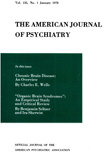Chronic Users of LSD: The "Acidheads"
Abstract
Twenty-one paid volunteers who were chronic users of LSD were interviewed and participated in a series of cognitive and perceptual tests and EEG studies. Among other observations derived from both interviews and testing, the authors noted that the group shared a set of magical-mystical beliefs and profound nonaggressive attitudes, as well as a unique sensitivity to certain types of sensory stimulation. The authors suggest that the beliefs and attitudes of the group may have arisen as learned consequences of frequent, intense LSD experiences in susceptible individuals.
Access content
To read the fulltext, please use one of the options below to sign in or purchase access.- Personal login
- Institutional Login
- Sign in via OpenAthens
- Register for access
-
Please login/register if you wish to pair your device and check access availability.
Not a subscriber?
PsychiatryOnline subscription options offer access to the DSM-5 library, books, journals, CME, and patient resources. This all-in-one virtual library provides psychiatrists and mental health professionals with key resources for diagnosis, treatment, research, and professional development.
Need more help? PsychiatryOnline Customer Service may be reached by emailing [email protected] or by calling 800-368-5777 (in the U.S.) or 703-907-7322 (outside the U.S.).



